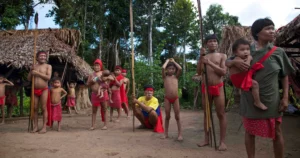The Yanomami, Brazil’s ancient indigenous group, face an escalating humanitarian crisis. President Lula declared a national emergency, recognizing the crisis at his inauguration.
However, Yanomami deaths increased in Lula’s first year—363 in 2023 versus 343 in 2022 under Bolsonaro.
Fourteen months into Lula’s term, Roraima sees the opening of a federal coordination center to address the crisis.
Thirteen ministers, including Environment Minister Marina Silva and Minister of Indigenous Peoples Sonia Guajajara, signal support for the Yanomami.
Their territory, Brazil’s largest at 9.5 million hectares, hosts about 27,152 Yanomami.

State neglect and illegal mining, polluting rivers with mercury, exacerbate the Yanomami’s suffering from diseases like pneumonia and malnutrition.
Last year, over 25,000 malaria cases were reported, impacting all 5,000 Yanomami near the Venezuelan border.
Government failures include lacking an effective emergency response and misallocating resources, prompting criticism of Lula’s administration for its inaction.
Immediate actions needed are land approval, strengthening of environmental and indigenous agencies (IBAMA and FUNAI), and revoking mining concessions on Yanomami land.
A R$1.2 billion ($250 million) budget until 2024 aims to build the first indigenous hospital in Boa Vista and upgrade 22 health facilities.
Illegal mining surged by 46% in 2021 under Bolsonaro’s government, with about 3,000 illegal miners remaining despite new measures.
Organized crime’s involvement complicates the crisis, underscoring the state’s failure to protect the Yanomami.
Urgent, effective interventions are essential for the Yanomami’s health and safety, highlighting the need for a committed governmental response to this deepening crisis.

